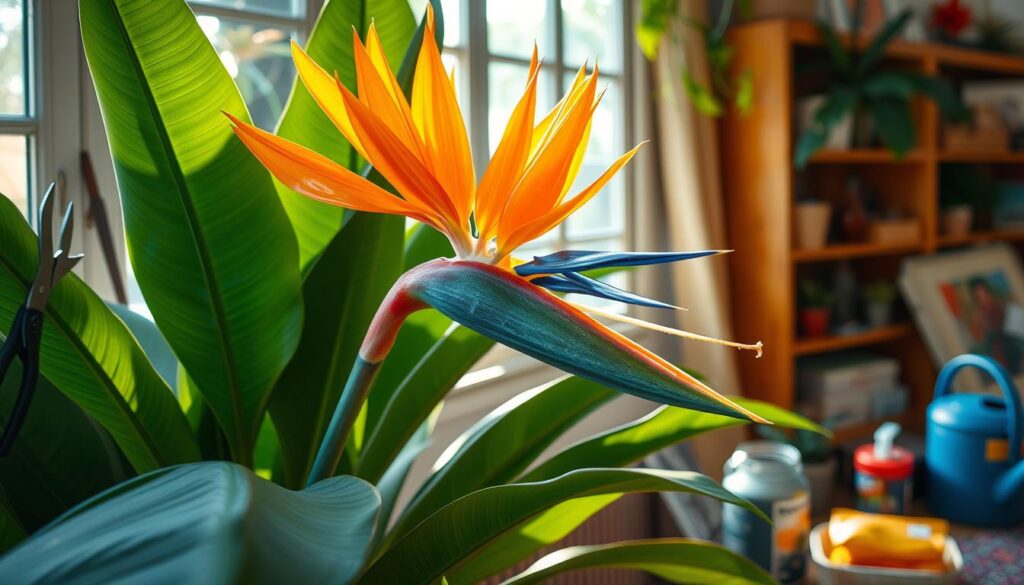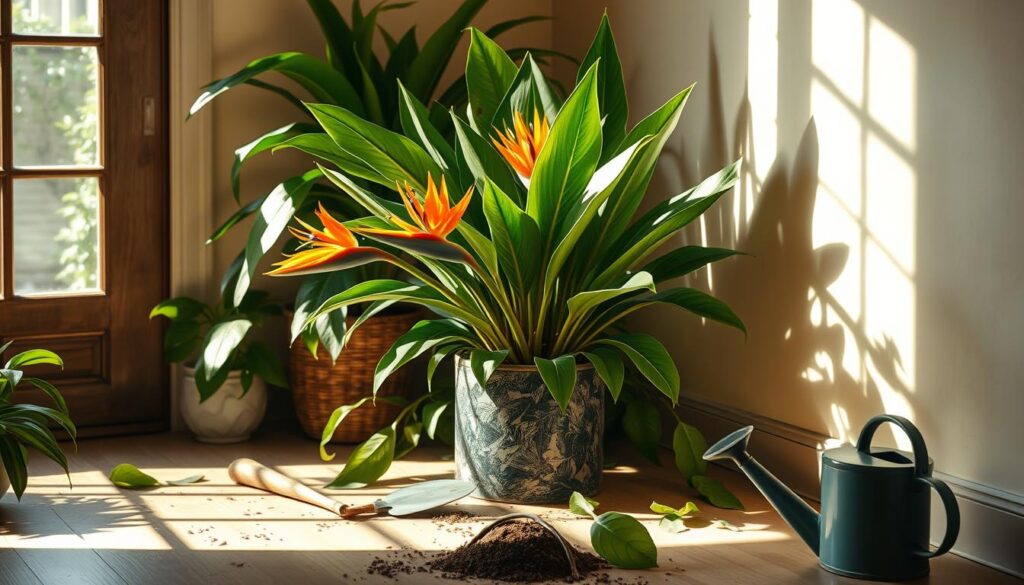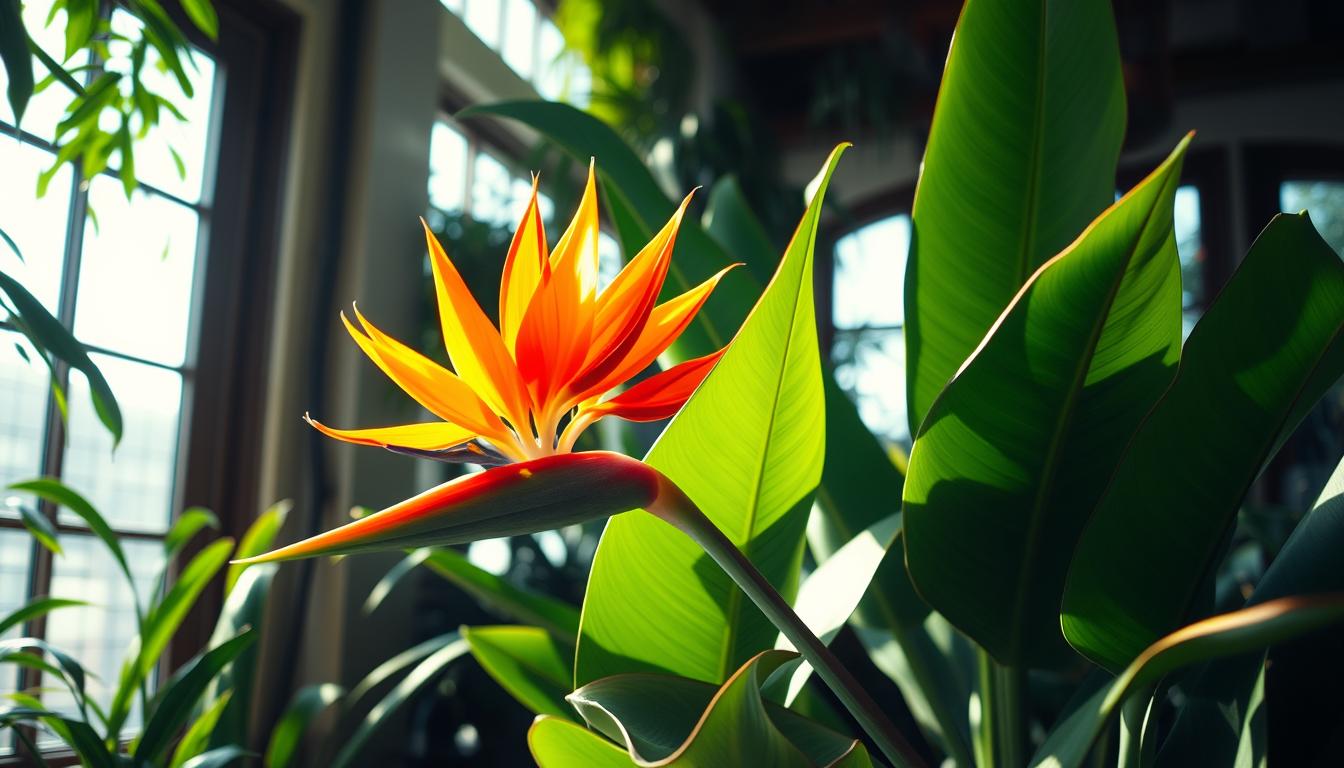Are you ready to add a touch of the tropics to your home? The Bird of Paradise plant is perfect for this. It has unique features that make any room feel like a tropical paradise. But, you might wonder how to keep it happy and healthy.
Learning about Bird of Paradise care is key. You’ll find out it needs specific conditions to thrive. This includes the right temperature, watering, and fertilization. With the right care, your home can become a lush oasis.
By following the right care tips, you can give your plant the best environment. Whether you’re new to gardening or experienced, Bird of Paradise care is exciting. Let’s explore the essential tips to keep your plant thriving.
Introduction to Bird of Paradise Care
Starting to care for your Bird of Paradise is exciting. It’s key to know how to keep it healthy. With the right tips, your plant will flourish and add beauty to your home. The Bird of Paradise is easy to care for, great for all gardeners.
To care for your Bird of Paradise, learn about its needs. It likes bright, indirect light. Water it often in the growing season but less in winter.
Importance of Proper Care
Good care is crucial for your Bird of Paradise’s health. Following the right tips helps avoid problems like too much or too little water. Also, keep your plant in a clean, well-ventilated spot to prevent pests and encourage growth.
Some important things to remember include:
- Let the top inch or two of soil dry before watering again
- Fertilize every two weeks when it’s growing
- Give it bright, indirect light
- Keep the temperature between 20-25 degrees Celsius
By following these tips, you’ll enjoy your Bird of Paradise’s beauty. Stay tuned for more tips to keep your plant happy and healthy.
| Category | Recommendation |
|---|---|
| Lighting | Bright, indirect sunlight |
| Watering | Allow top inch or two of soil to dry out between waterings |
| Fertilization | Fertilize every two weeks during active growing season |
Choosing the Right Location for Your Bird of Paradise
When it comes to Bird of Paradise care indoor, picking the right spot is key. Make sure your plant gets enough sunlight. Bird of Paradise plants need bright, indirect light. They can handle full sun, especially in West or South windows.
To make your plant happy, keep the temperature between 65°F-85°F (18°C-30°C). Also, keep humidity levels at 50-70%. You can use a tray with water and pebbles or a humidifier to boost humidity.
Sunlight Requirements
Bird of Paradise plants need bright, indirect sunlight to grow well. If you don’t have a sunny spot, grow lights are a good option. They should have a mix of red and blue light for your plant’s health.
Temperature Preferences
Temperature is very important for your Bird of Paradise plant. Don’t put it near heating vents, fireplaces, or drafty windows. Keep it in a spot with a steady temperature of 65°F-85°F (18°C-30°C) for best growth.
Humidity Levels
Right humidity is key for your Bird of Paradise plant. Mist it with water every day or use a humidifier. This will make your plant feel like it’s in its natural home.
Follow these tips to make your Bird of Paradise plant thrive. Give it the right sunlight, temperature, and humidity. Always learn what your plant needs for the best care.
| Factor | Optimal Level |
|---|---|
| Sunlight | Bright, indirect light |
| Temperature | 65°F-85°F (18°C-30°C) |
| Humidity | 50-70% |
Soil and Potting Needs
For Bird of Paradise plant care, the right soil and potting mix are key. A mix that drains well is vital to avoid waterlogged soil. This can cause root rot. The pot should be a bit bigger than the plant’s roots to help it grow.
The best soil for Bird of Paradise plants is loamy or rich. It should drain well. The soil’s pH should be between 5.5 and 7.5 for the plant to grow well. Water the plant well before planting and keep the soil moist during the growing season.
Pot size matters too. A 3- to 4-foot plant does well in a 10-inch pot. A 5- to 6-foot plant likes a 14-inch pot. By following these tips and a good care guide, your plant will grow and thrive.
| Pot Size | Plant Height |
|---|---|
| 10-inch pot | 3-4 feet |
| 14-inch pot | 5-6 feet |
Watering Your Bird of Paradise
Watering is key when caring for a Bird of Paradise. The plant likes moist soil but not too wet. Water it every 1-2 weeks, letting the top 2-3 inches of soil dry out first. For more tips, check out trusted houseplant guides.
Knowing the signs of too much or too little water is important. Too much water makes leaves droopy and split. Too little makes them dry and brown.
Signs of Overwatering
- Droopy leaves
- Excessive leaf splitting
- Browning edges with yellow lines on leaves
Understanding Underwatering Importance
Don’t forget, underwatering is bad too. Check the soil moisture before watering. Stick your finger in the soil up to the first knuckle. If it’s dry, it’s time to water.
By following these tips, you can keep your Bird of Paradise happy. Enjoy its beautiful flowers and leaves.
| Watering Frequency | Soil Moisture |
|---|---|
| Every 1-2 weeks | Top 2-3 inches of soil should dry out between waterings |
Fertilizing and Nutrition
Keep your Bird of Paradise happy by focusing on fertilizing and nutrition. Bird of Paradise care tips say using a balanced fertilizer is key. This helps the plant grow well.
A balanced fertilizer with a 1:1:1 ratio is best for Bird of Paradise plants. You can also use a 3-1-2 ratio for more nitrogen. Fertilize every two weeks when it’s growing and once a month when it’s not.
- Use a water-soluble fertilizer to avoid too much.
- Put a 2 to 3 inch layer of mulch around the plant.
- Keep a 2 to 3 inch area around the plant mulch-free.
By following these tips, your Bird of Paradise will bloom beautifully. Always read the fertilizer instructions and adjust how often you fertilize based on the season.
Pruning and Maintenance Tips
Pruning is key for a Bird of Paradise plant’s health and look. It’s best to prune in early spring. Keep any leaves with more than 50% live tissue when you cut.
Some important pruning tips are:
- Remove damaged leaves to help the plant grow new ones
- Make angled cuts to help the plant heal better
- Use sharp, clean tools to avoid disease
Check your plant often for signs of too much growth or damage. This will help you know when to prune. By following these tips, your Bird of Paradise will stay healthy and look great. Always use a care guide for the best care.

For specific pruning, know your Bird of Paradise type. For example, the red bird of paradise needs pruning 6-12 inches above the ground in late winter. The yellow bird of paradise might need old blooms cut and branches shortened if they’re too long.
| Plant Type | Pruning Instructions |
|---|---|
| Red Bird of Paradise | Prune 6-12 inches above the ground in late winter to early spring |
| Yellow Bird of Paradise | Cut away old blooms and reduce branches to half their length if necessary |
| Mexican Bird of Paradise | Cut away dry flower blooms and stalks in late winter or early spring |
Pest Management for Bird of Paradise
Managing pests is key for Bird of Paradise care. These plants can get spider mites and mealybugs indoors. It’s important to check for pests often and keep the air moist.
Some common pests to watch for include:
- Aphids
- Mealybugs
- Spider mites
- Scale
- Whiteflies
To fight pests, use neem oil or horticultural oil. Mix 1-2% oil with water. Check your plant often to keep it healthy and looking good. By following these steps, you can keep your Bird of Paradise safe from pests.
| Pest | Description | Remedy |
|---|---|---|
| Aphids | Small, soft-bodied insects | Neem oil or insecticidal soap |
| Mealybugs | White, cottony insects | Neem oil or horticultural oil |
| Spider mites | Tiny, spider-like insects | Insecticidal soap or neem oil |
Repotting Your Bird of Paradise
As you care for your Bird of Paradise, you’ll need to repot it soon. This is to give it fresh soil and a bigger pot. It might seem hard, but with the right tips, you can do it well. Experts say to repot every 2-3 years for the best growth.
Think about the plant’s age and pot size when deciding to repot. If the plant is too tight in its pot, it’s time. Check by gently taking it out and looking at the roots. If they’re all around the pot, it’s time to repot.
Step-by-Step Repotting Guide
To repot your Bird of Paradise, follow these steps:
- Choose a pot that’s just a bit bigger than the current one. A too big pot can hurt flowering.
- Use a potting mix that drains well. Mix loam-based compost with coarse grit.
- Gently remove the plant from its pot and check the roots.
- Trim any circling or dead roots to keep the plant healthy in the new pot.
- Put the plant in the new pot and add fresh mix. Make sure there’s room for water.
By following these tips, you can repot your Bird of Paradise well. Remember to do it in spring or summer when it’s not sleeping. Use a pot just a bit bigger to keep flowering good.

Common Issues and Solutions
When you care for your Bird of Paradise, you might face some common problems. These can affect its health and look. To solve these, knowing the causes and applying the right fixes is key. By using Bird of Paradise care tips, you can avoid or fix issues like yellow leaves and trouble with flowers.
Yellow leaves often mean you’re watering too much or too little. Flowering problems might be from not enough light or nutrients. To solve these, check your watering and adjust it with the seasons. In winter, water once a week. In spring and summer, water every day. Make sure your plant gets at least 4 hours of sunlight a day for best growth.
- Check the soil moisture by sticking your finger into the soil up to the first knuckle.
- Adjust the watering schedule based on the season and climate.
- Provide your plant with a balanced fertilizer during the growing season.
By following these tips and knowing about common issues, you can keep your Bird of Paradise healthy and strong. Always watch your plant closely and fix any problems quickly.
| Common Issues | Causes | Solutions |
|---|---|---|
| Yellowing Leaves | Overwatering or underwatering | Adjust watering schedule |
| Flowering Challenges | Lack of light or nutrients | Provide balanced fertilizer and sufficient sunlight |
Conclusion: Enjoying Your Tropical Indoor Paradise
The Bird of Paradise plant is a beautiful and easy-to-care-for addition to your home. It brings the tropical vibe right to you. By following the Bird of Paradise care guide in this article, you can make a lush tropical oasis.
Choose between the tall Strelitzia nicolai or the smaller Strelitzia reginae. Both plants have stunning leaves and, with time, the famous bird-like flowers. With the right care, your home will be a lush, healthy, and beautiful place.
Let the Bird of Paradise turn your home into a tropical oasis. Enjoy taking care of this amazing plant. It will bring beauty and peace to your daily life. If you would like to see other stunning statement Houseplants check out our post of 10 stunning large indoor houseplants!



Pingback: 10 Stunning Large Indoor Plants for Statement Decor - Trusted House Plant Guide